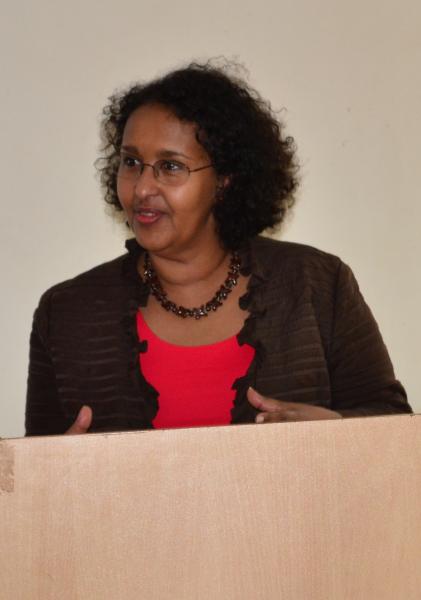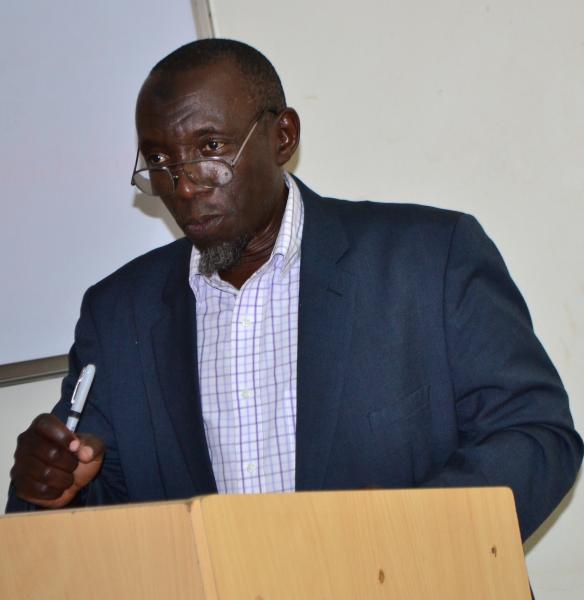
The School of Women and Gender Studies has launched an outreach training programme aimed at creating a formidable force of intellectuals with the ability to comprehend gender dynamics, plan  and advocate for gender equality from an informed position.
and advocate for gender equality from an informed position.
The programme was unveiled at a ceremony held on 30th September, 2015 to award certificates to 11 Isis-WICCE staff who had successfully completed a three-month training in feminism and gender analysis. The ceremony took place in the School of Women and Gender Studies Conference Hall.
According to the Dean, Assoc. Prof. Josephine Ahikire, the training was aimed at enhancing gender capacities of Isis-WICCE staff in feminist knowledge, analysis, planning, research, documentation and advocacy to enable them to effectively execute their organizational mandate of promoting women’s leadership in conflict and post conflict settings. Through the institutional needs assessment, a unique programme was developed to offer among others; critical reflections on the concept of gender; and essential insights into feminism and contemporary feminism engagements in conflict and post conflict contexts. The training was conducted by members of staff from the School of Women and Gender Studies including Prof. Grace Bantebya, Assoc. Prof. Josephine Ahikire, Dr Tabitha Mulyampiti, Dr Sarah Ssali, Dr Edith Okiria and Mr Fred Kindi. It was coordinated by Mr Amon Mwiine, Assistant Lecturer at the School of Women and Gender Studies.
Speaking at the ceremony, Assoc. Prof. Ahikire congratulated the staff of Isis-WICCE for their commitment to the course and urged them to use the knowledge and skills acquired to transform communities they work with. “We would like to thank our partners in the struggle for gender equity and equality for their commitment and request that we constantly re-focus our energies and re-tool amidst shifting discourses on gender,” she said.
Dr Ahikire noted that it was the School’s mandate to reach out to critical actors in championing issues of social equity, respect for human rights and gender equality. “In the programme, the school set out not only to respond to Isis-WICCE’s desire to strengthen their capacities in feminism and gender analysis but also to take Makerere University to the communities. As a school we reiterate our readiness and commitment to work with the Women’s Movement to achieve sustainable gender equity and equality,” she explained.
Ms Helen Kezie-Nwoha who represented the Executive Director of Isis-WICCE appreciated the School of Women and Gender Studies for effectively coordinating the programme. She said it was important for all staff of Isis-WICCE to acquire feminist skills to effectively implement the organization’s activities. “The promotion of women’s rights in societies that are patriarchal requires  skills and knowledge in feminism and gender analysis, research and documentation as well as planning and gender aware advocacy for gender responsive social change. We needed the training to critically reflect on the concept of gender and feminism and their intersection with governance,” she said. Ms Kezie-Nwoha is the Programme Manager of Isis-WICCE.
skills and knowledge in feminism and gender analysis, research and documentation as well as planning and gender aware advocacy for gender responsive social change. We needed the training to critically reflect on the concept of gender and feminism and their intersection with governance,” she said. Ms Kezie-Nwoha is the Programme Manager of Isis-WICCE.
During the ceremony, the trainees represented by Ms Proscovia Nakaye, Ms Harriet Musoke and Ms Juliet Were testified that the programme had deepened their understanding of the concepts of gender and feminism. They said they were now in better position to write, research and analyse issues in their field of work. “The training was an eye opener to the fact that the Women’s Movement lacks information sufficient for gender analysis. The programme will further build the intellectual capacity of the Women’s Movement,” Ms Musoke said.
In his remarks, the Deputy Principal of the College of Humanities and Social Sciences (CHUSS), Prof. Abasi Kiyimba, applauded the School of Women and Gender Studies for making significant strides in advancing the analysis of gender issues in the region. Giving a brief on the role played in the promotion of gender parity, Prof. Kiyimba said the Department of Literature revised its curriculum in 2000 to promote women writers and to exclude works that were gender insensitive. He said gender analysis is an obligation of every scholar.
Prof. Kiyimba noted that the University had made significant progress in the struggle for gender parity by, among others; establishing the Directorate of Gender Mainstreaming that has been instrumental in bridging the gap in admissions; mainstreaming gender studies in the University curriculum; and introducing the Anti-Sexual Harassment Policy. He further said the creative writing arm, FEMRITE, was nurtured at Makerere University. FEMRITE - Uganda Women Writers Association is an indigenous Non-Governmental Organisation that promotes women writers in Uganda. The organisation was founded by Hon. Mary Karooro Okurut in 1995 and officially launched on 3rd May 1996 at the Uganda National Cultural Centre. Hon. Karooro Okurut served as a Lecturer in the Department of Literature at Makerere University between 1981-1993.
Prof. Kiyimba called for full involvement of men in the struggle for gender parity. “Whenever discussions on gender get passionate the feeling is the oppressor is male, yet they also suffer oppression,” he said, adding that the struggle for gender parity is a collective responsibility.
Prof Kiyimba appealed to the School of Women and Gender Studies to provide a framework for gender struggle that is appropriate to Uganda.
UN Women Country Representative, Ms Hodan Addou, congratulated the School of Women and Gender Studies and Isis-WICCE for what she described as “a much needed programme that invests in a cadre of feminist experts and professionals”. She said the conclusion of the training programme coincided with the historic adoption of the new Sustainable Development Goals (SDGs) by World Leaders in New York. “The new sustainable development agenda offers a real opportunity to drive lasting change for women’s rights and equality, and to bring universal, comprehensive and transformative change in women and men’s lives. Choosing the appropriate indicators and thorough and effective monitoring of progress on gender equality across all the 17 Goals will be important to ensure that women and girls are benefiting. It is therefore crucial to ensure that institutions such as the School of Women and Gender Studies and other women’s organizations work closely with line ministries of government to effectively monitor how the SDGs are implemented,” she advised. Ms Addou called for continued commitment to the struggle for gender equality.
About Isis-WICCE
Isis-WICCE (Isis- Women's International Cross Cultural Exchange) is a global women rights advocacy  organisation founded in Geneva in 1973. It moved to Uganda in 1994 with a focus on enhancing women’s leadership in conflict and post-conflict settings. The organization’s programming is grounded in social and gender justice with strong commitment towards igniting women’s leadership and deepening their activism in the struggle for social change.
organisation founded in Geneva in 1973. It moved to Uganda in 1994 with a focus on enhancing women’s leadership in conflict and post-conflict settings. The organization’s programming is grounded in social and gender justice with strong commitment towards igniting women’s leadership and deepening their activism in the struggle for social change.
